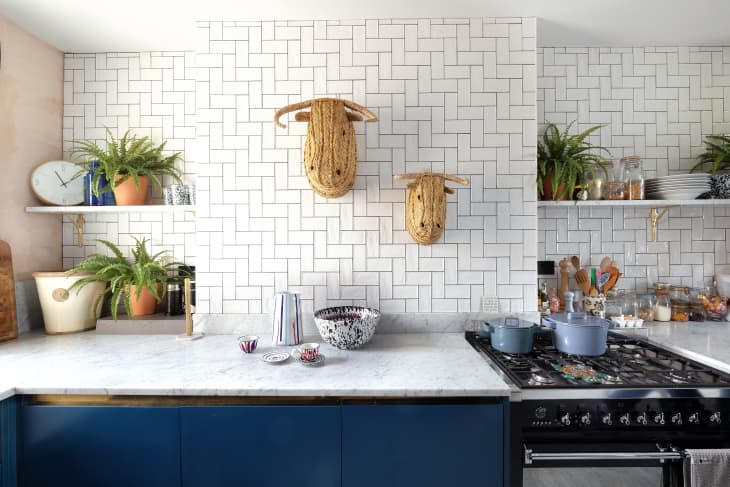The Best Kitchen Countertop Materials, According to Home Builders

For the past 20 years or so, granite has reigned supreme as the most popular choice for countertop materials in homes. But, in recent years, a new competitor has emerged: quartz. But, putting trends and popularity aside, which countertops actually do the best job, year in and year out? To find out, we talked to two home builders about the best countertop materials in terms of durability, maintenance, and aesthetics. Read on for their insights:
Note: While we broke the choices down into price levels, it’s worth noting that most materials—particularly stone—can range wildly in price. For our purposes, we’re focusing on average costs.
Entry-level
Laminate
Laminate is an excellent alternative to hardwood flooring, so why not consider it for your countertops, too? Patti Guthrie, vice president of ARH Interiors at Arthur Rutenberg Homes in Clearwater, Florida, said the material is a great, inexpensive option.
“[Laminate is] a relatively low-maintenance alternative to more expensive granite, stone, and solid-surface countertops,” she said. “Many laminates offer a variety of styles that mimic more expensive surfaces such as granite or quartz.”
However, one downfall is that laminate scratches easily and is not heat resistant.
Wood or butcher block
If you want something a little pricier than laminate but not as costly as stone, Guthrie recommends wood or butcher block counters, which fit nicely into the trendy modern farmhouse aesthetic. Wood counters require proper maintenance, including regular oiling, otherwise they’ll crack and look dull. Guthrie also notes that, like laminate, wood and butcher-block surfaces scratch easily.
Ceramic Tile
Guthrie says another affordable option is ceramic tile, which is made from pressed clays and finished with a glaze. It’s generally resistant to heat, water, and staining—if sealed properly. However, the grout lines between tiles will get dirty over time and require cleaning every so often, she says.
Mid-range
Granite
As mentioned, stone countertops like granite vary in price, depending on the type you choose.
“This product can range in pricing from $50 to $80 per square foot to easily in the hundreds of dollars per square foot for exotic slabs,” Guthrie says.
But that upfront cost might be a great investment. Granite is generally considered a good value, says Sean D. Sullivan, president of Living Stone Design+Build in Black Mountain, North Carolina.
“Granite is still a solid choice because it holds up well to heat and stains,” he says. “It is also a prevalent material, so that keeps it affordable.”
Durability and no-frills maintenance are a big part of granite’s appeal. Another benefit? It comes in a variety of colors and patterns to fit any style.
Corian
A composite of acrylic polymer and alumina trihydrate, Corian is becoming more prevalent for countertops, Guthrie says. It’s available in a diverse array of colors, is easy to maintain, and is very durable.
“[Corian countertops] are known for their seamless installation, and they have the ability to integrate sinks and backsplashes,” she says.
High-End
Quartz
Quartz (made from ground quartz stone combined with polyester resins and pigments) is becoming increasingly popular as a countertop material, particularly for those who find granite passé.
“Since quartz is a man-made product, it has a more consistent look and is therefore more contemporary in finish, appealing to today’s buyer,” Sullivan said.
While it ranges in price, quartz is, on average, more expensive than granite. However, its benefits are many: First off, thanks to its resin content, quartz is non-porous and doesn’t require sealing, Guthrie says.
“Its texture does not allow bacteria, mold, or mildew to grow, and it resists stains, which protects your family and makes kitchen cleanup super easy,” she says. “A cloth with warm soapy water is really all you need to keep this countertop looking brand new.”
It’s known to be very strong and durable, often lasting 10 to 15 years and sometimes even comes with a lifetime guarantee from the manufacturer, Sullivan says.
Plus, because quartz is man made, it comes in an endless variety of hues, often embellished with flecks of metal or recycled glass for added flair, Guthrie says. You can even choose from various finishes, including matte, honed, leathered, and embossed.
Although affluent homeowners may desire the sophisticated look of marble, Sullivan doesn’t recommend it since it’s very expensive and high-maintenance because it’s a softer stone. Instead, he steers clients toward a quartz with a marble look.
More great Real Estate reads:
- The First Things You Should Buy for Your New Home, According to Real Estate Agents
- 11 IKEA Products Under $5 Every Renter Needs
- You Must See the Kitchen in This Dreamy Los Angeles A-Frame Home
- The One Expensive Thing Your Homeowners Insurance Probably Doesn’t Cover
- The Best Tiny House Hotels to Stay In, Starting at $75/Night